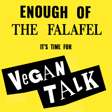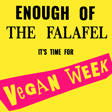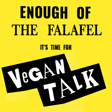
203- What is the most effective form of activism?
A topic that is almost impossible to decide in any quantifiable way...but that's not stopped Andrea Polanco having a go. In an article published three years ago with Faunalytics (https://faunalytics.org/relative-effectiveness/) two studies are combined to examine what may be helping...and hindering our activism. Responding to the studies in this episode are Mark, Kate & Ant.
As ever, we love hearing your views on the topics under discussion (or anything else!) so do drop us your thoughts via enoughofthefalafel@gmail.com
*************
Enough of the Falafel is a community of people who love keeping on top of the latest news in the world of veganism & animal rights. With the Vegan Talk podcast, we aim to develop listeners' (& our own) thoughts around key issues affecting veganism & the animal rights movement; giving our opinions, whilst staying balanced; remaining true to our vegan ethics, whilst constantly seeking to grow & develop.
Each week we home in on one topic in particular and pick it apart in more detail. If you have a suggestion for a future show, do get in touch via enoughofthefalafel@gmail.com.
*******************
Thanks everyone for listening; give us a rating and drop us a message to say "hi"; it'll make our day!
Kate, Mark & Anthony


